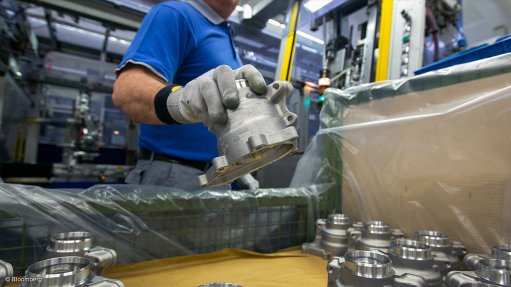
PLAYING ITS PART
The creation of an automotive component manufacturing specific chamber at the Merseta enables this subsector to deal with its own unique skills issues
Photo by: Bloomberg
The creation of an automotive component manufacturers chamber at the Manufacturing, Engineering and Related Services Sector Education and Training Authority (Merseta) has been a “game changer”, says National Association of Automotive Component and Allied Manufacturers (NAACAM) executive director Renai Moothilal.
He says that, owing to legacy issues, automotive component manufacturers have had their skills-specific issues grouped with other unrelated aspects of the motor industry such as motor body repairers and aftermarket retailers.
“The nature of automotive component manufacturing in South Africa has changed significantly over the past 25 years, where the majority of these companies are now part of global value chains. The creation of an automotive component specific chamber at the Merseta enables this subsector to deal with its own unique skills issues,” Moothilal explains to Engineering News.
He notes that NAACAM members have swiftly responded by devoting expertise to form part of chamber committees that directly address component-manufacturing skills issues.
He adds that there is an opportunity to motivate for support programmes, through the Merseta, that deal with the sector’s own skills development needs in a targeted manner.
Moothilal emphasises that automotive component manufacturers should recognise that the development of skills under the South African Automotive Masterplan 2035 (SAAM35) framework is a key objective, and it is to their benefit to use and engage the Merseta as a key implementation agent of skills development in the sector.
Importance of Sector
The automotive components manufacturing industry is significant in the context of South Africa’s goal of developing a deep and capable, productive local manufacturing base.
Moothilal explains that the automotive component manufacturing sector is globally recognised as having the potential to positively impact on economies in terms of employment, skills, technology transfer and new-venture creation, by virtue of their insertion into large global value chains and the adherent standards and economies of scale introduced.
“Moreover, the South African government’s stated objective of increasing localisation and transformation can be well served within an automotive component manufacturing context,” he says, noting that skills are a crosscutting barrier to localisation.
Moothilal states that, without an adequate skills base in South Africa, automotive component manufacturers may be unable to embed the necessary technologies and production processes which are required for them to be globally competitive.
Advanced technical skills are a new requirement of “factories of the future”, which are oriented for large-volume export opportunities.
“Having a sustainable and well-skilled pipeline of young people will gear South African automotive component suppliers to use world-leading technologies more effectively to unlock new local content, in line with the SAAM35 objectives,” he adds.
Additionally, NAACAM is committed to driving diversity, inclusion and transformation in the automotive sector.
“Our programmes have a distinct focus on developing critical technical skills for youth, women, people of colour and people with disabilities,” Moothilal explains, adding that it is critically important that women are represented in senior technical roles in the sector.
The High Gear initiative – a skills ecosystem development collaboration between the Department of Higher Education and Training, NAACAM and the International Youth Foundation – aims to support transformation by delivering an engaging and inclusive framework for skills development that encourages the active participation of women.
“Understanding the gap between industry requirements and technical vocational education and training curricula is critically important so that High Gear can augment existing curricula to be more automotive component sector relevant,” Moothilal explains.
To help understand this gap, NAACAM undertakes a quarterly skills survey among members to unearth granular data around the automotive component manufacturing specific nuances within the skills development ecosystem.
Additionally, NAACAM received a Merseta discretionary grant that is being used to reskill 300 retrenched workers, and fund 18 engineering bursaries and 15 apprenticeships. There is a priority focus on the inclusion of women.
Meanwhile, the Automotive Supply Chain Competitiveness Initiative (ASCCI) takes a more technical approach to skills development and supports the capacitation of suppliers in production optimisation and efficiency.
NAACAM provides a facilitation service to ASCCI and has implemented a novel approach to embedding lean fundamentals in component manufacturers.